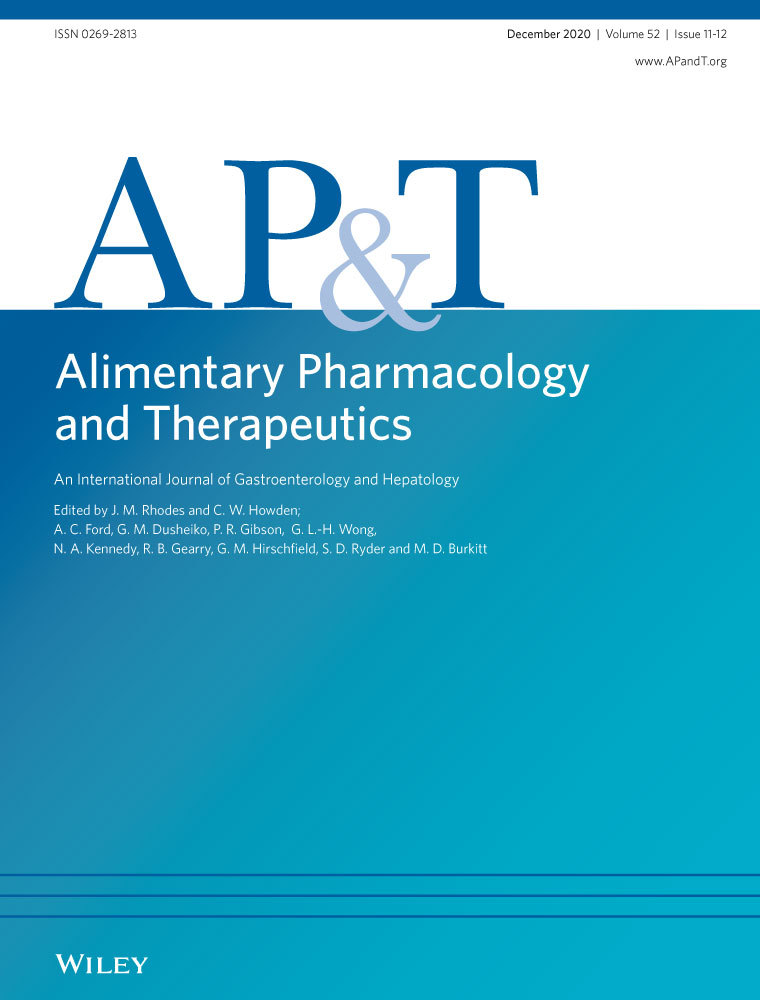Editorial: the microbiome, aspirin and colorectal cancer
Abstract
LINKED CONTENT
This article is linked to Prizment et al papers. To view these articles, visit https://doi.org/10.1111/apt.16013 and https://doi.org/10.1111/apt.16115
Daily aspirin intake, in doses as low as 75 mg, confers a reduction in one's risk of developing colorectal cancer (CRC).1 This benefit is linked to its use for more than 5 years.1, 2 As inflammation is associated with the development and progression of many cancers, it comes as no surprise that mechanisms proposed to explain the beneficial impact of aspirin on cancer risk include the inhibition of cyclo-oxygenase (COX), a key enzyme in the synthesis of prostaglandins and thromboxane.3 The emergence of data indicating an influence of gut microbiota on the pathogenesis of cancer, including CRC, and on the response to chemotherapeutic drugs, provides another avenue for exploration. Studies of gut and salivary microbiota may not only help to identify those at risk of CRC, but also those likely to benefit from aspirin chemoprevention.4
The study by Prizment and colleagues takes these interactions a step forward by identifying links between bacterial taxa associated with CRC and aspirin-induced changes in microbial diversity.5 A 6-week 325 mg/d aspirin challenge increased the abundance of Clostridium XIVa, Ruminococcus and Akkermansia and decreased the abundance of Parabacteroides and Dorea; findings consistent with those of a previous meta-analysis on gut microbiota patterns in CRC and also resonant with the known anti-inflammatory and immune-modulating effects of these taxa and their metabolites.5, 6 Interestingly, following a 6-week washout, microbial composition in both aspirin and control arms were similar, though different from baseline.5 Thus, the aspirin effects were short-lived and reverted to baseline on withdrawal. Furthermore, some of the observed changes might be explained by confounders such as diet, exposure to other lifestyle factors and comorbid and, perhaps, unidentified disease; not to mention the impact of methodological issues related to microbial analysis.5 The presence of a control group in this study helped mitigate some of these effects but its short-term nature precluded the all-important definition of the longer term effects of aspirin on the microbiome.5 Could, for example, the microbiome adapt to aspirin over time and lose those signatures associated with cancer prevention? Other key issues such as effective aspirin dose range remain to be defined.
Clear evidence for a risk-reduction effect of aspirin in microbial-mediated CRC is necessary, not least because of the risk, over the long term, of such aspirin-related side effects as small intestinal mucosal injury and ulcer formation.7 Of relevance to the anti-cancer effects of aspirin, it has recently been shown that a microbial intervention with a probiotic organism, Bifidobacterium breve (Bif195),7 abrogated aspirin effects on the small intestine. Prizment and colleagues5 are correct in concluding that the further elucidation of aspirin-microbial interactions may inform large, longer duration, variable dose studies.8
Microbiome studies provide several enticing possibilities for progress in CRC diagnosis and prevention: the definition of microbial signatures that predict cancer risk and treatment response,4 the development of microbe-modulating interventions that augment the chemopreventive effects1 of aspirin and the exploration of microbial manipulation strategies in therapy.
ACKNOWLEDGEMENT
Declaration of personal interests: None.
Declaration of funding interests: None




